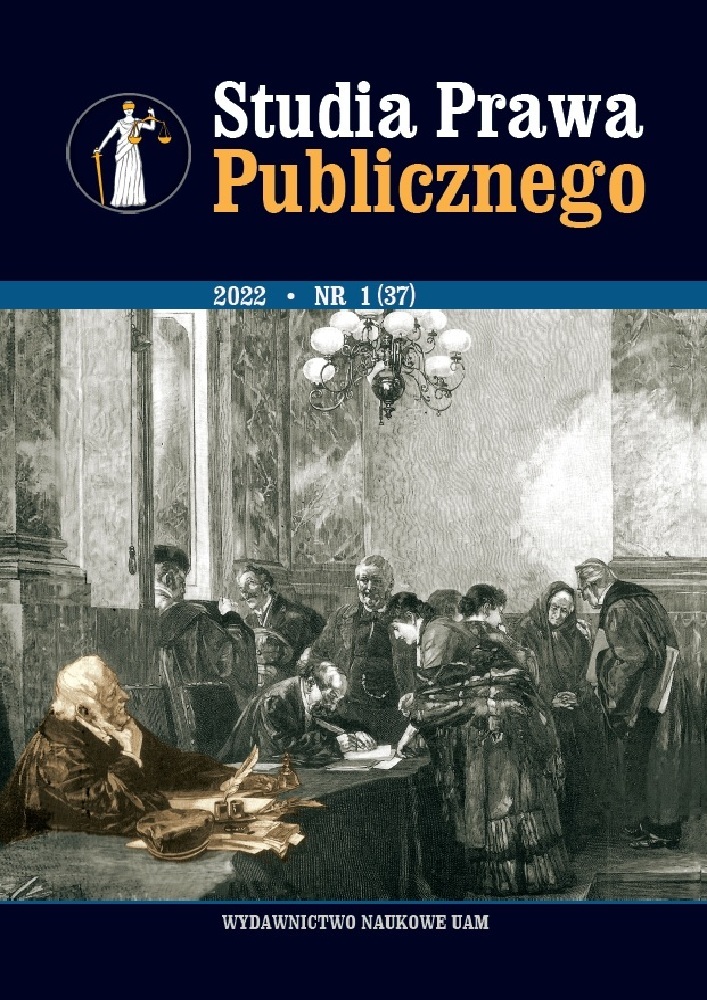Abstract
The subject of this article is the procedure for selecting a saint of the Roman Catholic Church patron saint for the city, municipality or wider territory. The establishment of a patron saint is within the competence of the confessional authority, in particular, the bishop and the Congregation for Divine Worship and the Discipline of the Sac-raments. The procedure consists of three stages: the election, acknowledgement and affirmation of the patron saint. The church’s current regulations regarding the election of patron saints are contained in two documents of the Holy See. The municipal council, the poviat council and the assembly of the province pass a res-olution on the patron at the stage of his election by the society and the clergy. The above-mentioned authorities do not take part in the next two stages. Entities of territorial self-government only have a supporting vote. They cannot independently establish a patron saint, regardless of the decisions of the ecclesiastical authorities. The position of administrative courts that the resolutions of the constitutive au-thorities of entities of territorial self-government belong to the category of public administration matters is unjustified. The decree of the Congregation for Divine Worship and the Discipline of the Sacraments is addressed to a given diocese and not to local self-government authorities. The patron saint is established for a city, mu-nicipality, poviat, or for an area that does not have administrative borders. Entities of territorial self-government must respect the autonomy of the church authorities, and public authorities should be impartial in religious matters. Therefore, entities of territorial self-government do not have the competence to establish a patron saint for the promotion of a municipality, district or self-government of the voivodship. However, they can refer to saint persons at the symbolic level, for example, in the coat of arms or the names of streets and squares. This also applies to schools and hospitals run by local self-government authorities.
References
Borecki P., W sprawie autonomii i niezależności związku wyznaniowego – uwagi na tle postanowienia Sądu Najwyższego – Izba Cywilna z 12.05.2016 r., IV CSK 529/15, „Polski Proces Cywilny” 2018, nr 1.
Brzozowski W., Glosa do wyroku Naczelnego Sądu Administracyjnego z dnia 12 marca 2013 r. (sygn. akt I OSK 1997/12), „Zeszyty Naukowe Sądownictwa Administracyjnego” 2013, nr 5.
Kroczek P., Prawo wewnętrzne związków wyznaniowych w perspektywie organów władzy publicznej. Klauzule generalne, Kraków 2017.
Maroń G., Argumenty religijne w procesie ustawodawczym w Sejmie Rzeczypospolitej Polskiej VIII kadencji, „Przegląd Sejmowy” 2019, nr 4.
Maroń G., Instytucja ślubowania radnego jednostki samorządu terytorialnego w polskim porządku prawnym, „Przegląd Prawa Publicznego” 2014, nr 11.
Maroń G., Prawne aspekty ustanawiania świętych i błogosławionych patronami jednostek samorządu terytorialnego, Rzeszów 2021.
Niżnik-Dobosz I., Ustrojowe i materialnoprawne ujęcie wspólnoty samorządowej, „Casus” 2009, nr 54.
Normy dotyczące ustanawiania patronów, „Anamnesis” 85(2016), nr 2.
Ożóg M., Samorząd terytorialny – uchwała organu gminy w sprawie ustanowienia patrona gminy – interes prawny lub uprawnienie skarżącego, „Orzecznictwo Sądów Polskich” 2017, nr 7–8.
Ożóg M., Ustanawianie osób świętych lub błogosławionych Kościoła katolickiego patronami jednostek samorządu terytorialnego w świetle prawa polskiego, „Przegląd Prawa Wyznaniowego” 2017, nr 9.
Ożóg M., Współdziałanie Kościoła Katolickiego i organów jednostek samorządu terytorialnego w sprawie ustanowienia patrona wspólnoty samorządowej, „Studia z Prawa Wyznaniowego” 2019, t. 22.
Płaszowska R., Analiza zasad realizacji zadań z zakresu promocji gminy i powiatu w świetle orzecznictwa sądowego, „Przegląd Prawa Publicznego” 2017, nr 11.
Posoborowe prawodawstwo kościelne, zebr. i przetł. E. Sztafrowski, t. III, z. 2, Warszawa 1971.
Puszyński Ł., Herby jednostek samorządu terytorialnego i niektóre problemy związane z ich używaniem, „Casus” 2011, nr 62.
Słownik łacińsko-polski, oprac. K. Kumaniecki, Warszawa 1988.
Syczewski T., Patronaty świętych i błogosławionych w aktualnym prawodawstwie Kościoła łacińskiego, „Rocznik Nauk Prawnych” 2017, tom XXVII, nr 4.
Święty Roch zostanie patronem Kociewia?, https://www.kociewiak.pl/wiadomosci/13051,swiety-roch-zostanie-patronem-kociewia (dostęp: 8 III 2022).
License
Copyright (c) 2022 Krzysztof Świderski

This work is licensed under a Creative Commons Attribution-NonCommercial-NoDerivatives 4.0 International License.

